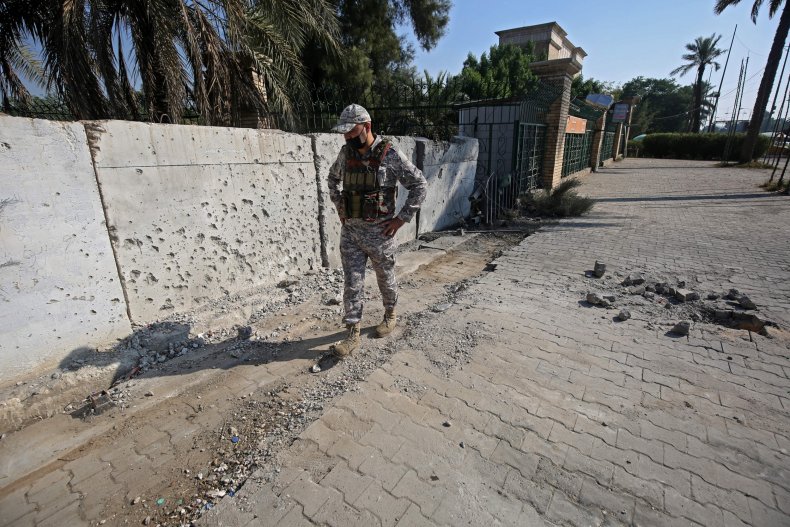Iran’s foreign minister accused President Donald Trump of trying to distract from America’s coronavirus crisis by threatening a war with Tehran, just weeks before he is due to leave office and be replaced by President-Elect Joe Biden, who has vowed to re-engage with the Iranian regime after four years of tensions.
Trump has been turning the screws on Iran throughout the transition period, doubling down on his “maximum pressure” campaign to cripple the nation’s economy and isolate the regime.
Observers have warned that Trump could take aggressive military action on Iran during his lame duck period, and on Wednesday the president hinted that attacks on American interests by Iranian-backed militias in neighboring Iraq had opened the door for him to do so.
“Some friendly health advice to Iran: If one American is killed, I will hold Iran responsible,” Trump wrote. “Think it over.”
But Zarif tweeted late Wednesday claiming Trump was using long-standing tensions in Iraq to divert attention away from his administration’s bungling of the coronavirus pandemic in the U.S., where the virus has so far killed more than 326,000 people and infected more than 18.4 million.
“Putting your own citizens at risk abroad won’t divert attention from catastrophic failures at home,” Zarif wrote.
The foreign minister—who regularly uses Twitter and other social media platforms to mock Trump and other Western leaders, although the websites are banned in Iran—posted screenshots of past Trump accusing Obama of trying to start a war with Iran to distract from his domestic struggles.
“In your own words,” Zarif wrote, uploading screenshots including one in which Trump claimed: “In order to get elected, @BarackObama will start a war with Iran.”
Tensions with Iran have punctuated Trump’s presidency, and the two sides have come close to war several times during his term. Assassinations, sanctions, military pressure and diplomatic isolation have failed to force Tehran back to the table to renegotiate the Joint Comprehensive Plan of Action nuclear deal from which Trump withdrew in 2018.
Iranian officials have claimed victory over Trump following his defeat by Biden. The president-elect has said he wishes to revive the JCPOA and re-open dialogue with Iran, which will include much needed sanctions relief for Tehran.
The national economy has been crippled and further suffocated by the coronavirus pandemic. Iran became the epicenter of the outbreak in the early weeks of the pandemic, and its medical system has been overwhelmed by the number of cases.
At least 54,000 people have died in Iran with more than 1 million infected. Observers believe the true number is much higher, and the State Department has accused Iran of hiding the true toll.
But there remain several weeks in which tensions could again spill over into open conflict. Iranian-backed Iraqi militias have recently resumed attacks on American targets.
Militias announced a pause in attacks in October, demanding the Americans use the time to present a roadmap for full military withdrawal from the country. Attacks resumed in November, and multiple rocket barrages and IEDs have since targeted U.S. facilities and convoys.
Last weekend, the heavily fortified Green Zone in Baghdad once again came under attack. Unidentified militia members—backed by Iran, according to the State Department—fired a barrage of rockets towards the U.S. embassy, damaging buildings and wounding at least one civilian.
The Wall Street Journal reported that 21 rockets were fired, making its the largest attack on the American embassy in Baghdad since 2010.
Trump Wednesday tweeted a photo of three Iranian-made rockets that failed to fire during the attack and were recovered by investigators.
“Our embassy in Baghdad got hit Sunday by several rockets,” Trump wrote. “Three rockets failed to launch. Guess where they were from: IRAN. Now we hear chatter of additional attacks against Americans in Iraq.”
Iraq has been the main battlefield for the simmering U.S.-Iran confrontation. Iran-trained and funded militias killed hundreds of occupying American troops there after the invasion to topple dictator Saddam Hussein.
Iran used the chaos unleashed by the disastrous American invasion to grow its influence in Iraq, and Tehran now dictates the country’s path with the help of its heavily armed and influential allied militias.
The U.S. embassy in Baghdad is a regular target of attacks, prompting the Trump administration to recently warn it may close the facility entirely if the Iraqi government cannot guarantee its security. Last year, for example, protesters including militia members stormed and ransacked the embassy.
Weeks later, a U.S. drone assassinated Iranian Major General Qassem Soleimani outside Baghdad airport. The commander of the Islamic Revolutionary Guard Corps covert Quds Force, Soleimani was considered the second most powerful regime figure and credited with masterminding Iran’s foreign policy for decades.
Iran retaliated with ballistic missile strikes on Iraqi bases hosting U.S. troops, wounding more than 100. Iranian-aligned Iraqi lawmakers, meanwhile, pushed for American troops to leave the country entirely.
Trump has announced an Iraq drawdown to 2,500 troops by January, and America’s departure from Iraq—and expanded Iranian influence—appears a foregone conclusion.
But the final weeks of Trump’s term will be nervous ones for Tehran, and for Americans and their allies around the world. Reuters reported Wednesday that top national security officials had presented Trump with a range of options to deter attacks on U.S. military or diplomatic personnel in Iraq.
It is not clear what the options were, but they could include aggressive action against Iranian personnel or Iran-backed militias. In the past, the Trump administration has responded to attacks on American interests with airstrikes against militia groups and assassinations of leaders, for example.

AHMAD AL-RUBAYE/AFP via Getty Images/Getty

No comments:
Post a Comment